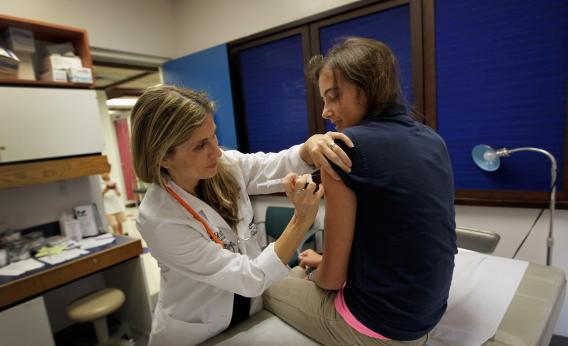Setting aside Michele Bachmann’s campaign remarks, there’s been a lot of talk about the importance of vaccinating teen girls against the cervical-cancer-causing human papillomavirus, better known as HPV, since the first vaccine was approved in 2006. But now that we’re several years in, it turns out even those who haven’t been vaccinated are reaping the benefits of the drive to vaccinate against HPV. It’s the “herd immunity” effect at work, and while that sounds like something for livestock rather than teen girls, it’s a decidedly good thing because it has resulted in a substantially lower number of girls infected with HPV.
The Telegraph reports on the discovery, which was made by researchers at the Cincinnati Children’s Hospital Medical Center. Back in 2006 and 2007, the research team, led by Dr. Jessica Kahn, looked at 368 girls in Cincinnati between the ages of 13 and 16. They’d all had sexual contact, but none of them had been given the newly approved HPV vaccine. Then in 2009 and 2010, they recruited 409 different girls in the same age range. More than one-half of these young women had gotten at least one dose of the vaccine. (Normally three shots are given over six months, but not all girls follow up to get the full dose). They compared the HPV prevalence rates between the two groups and found that it had gone down from 31.7 percent to 13.4 percent—an overall decrease of 58 percent. Among those who’d been vaccinated, there was a whopping 69 percent decrease, but those who had not been vaccinated still saw an impressive 49 percent drop in HPV infection.
It appears that the vaccines are doing enough to inhibit the spread of disease that even girls who haven’t been vaccinated aren’t being exposed like they once were. Hence the entire herd of young ladies benefits from the actions of a relative few—and the impact of this effect could be great, according to Kahn:
Two of these HPV types, HPV-16 and HPV-18, cause about 70 per cent of cervical cancer. Thus, the results are promising in that they suggest that vaccine introduction could substantially reduce rates of cervical cancer in this community in the future.
Kahn warns that these findings shouldn’t make us any less aggressive in our efforts to ensure all young women are vaccinated. The more people who are vaccinated, the less the disease spreads, and right now almost one in four women who aren’t vaccinated have at least one strain of HPV. Translation: Do not rely on everyone else to do the right thing.
The HPV vaccine is currently only approved (and covered by insurance) for people under the age of 26, but there has been considerable debate about whether to start giving it to older women as well. This new research makes it seem all the better to vaccinate women of all ages who haven’t yet been infected. Sure, the herd immunity effect might not be as strong, since by 26, many women have already had multiple sexual partners, making them more likely to have been exposed to HPV already. Still, if the numbers are so fantastic for the younger group of women, why not try to reduce infection for everyone?
